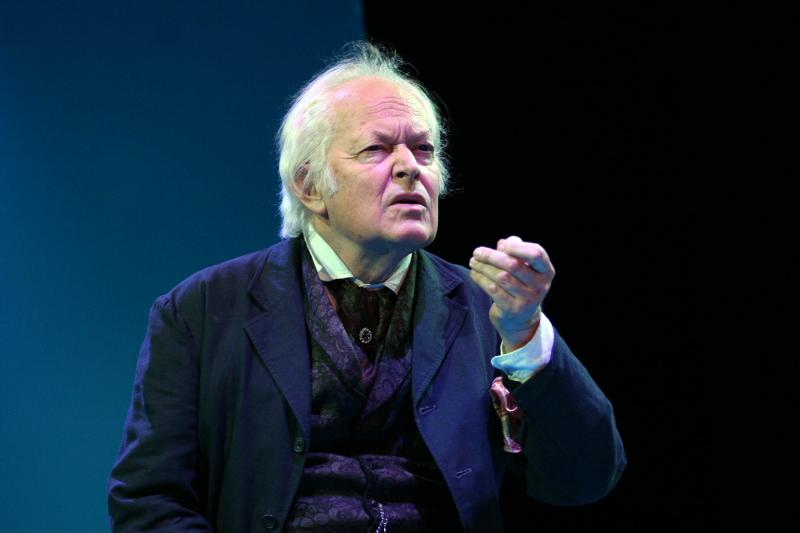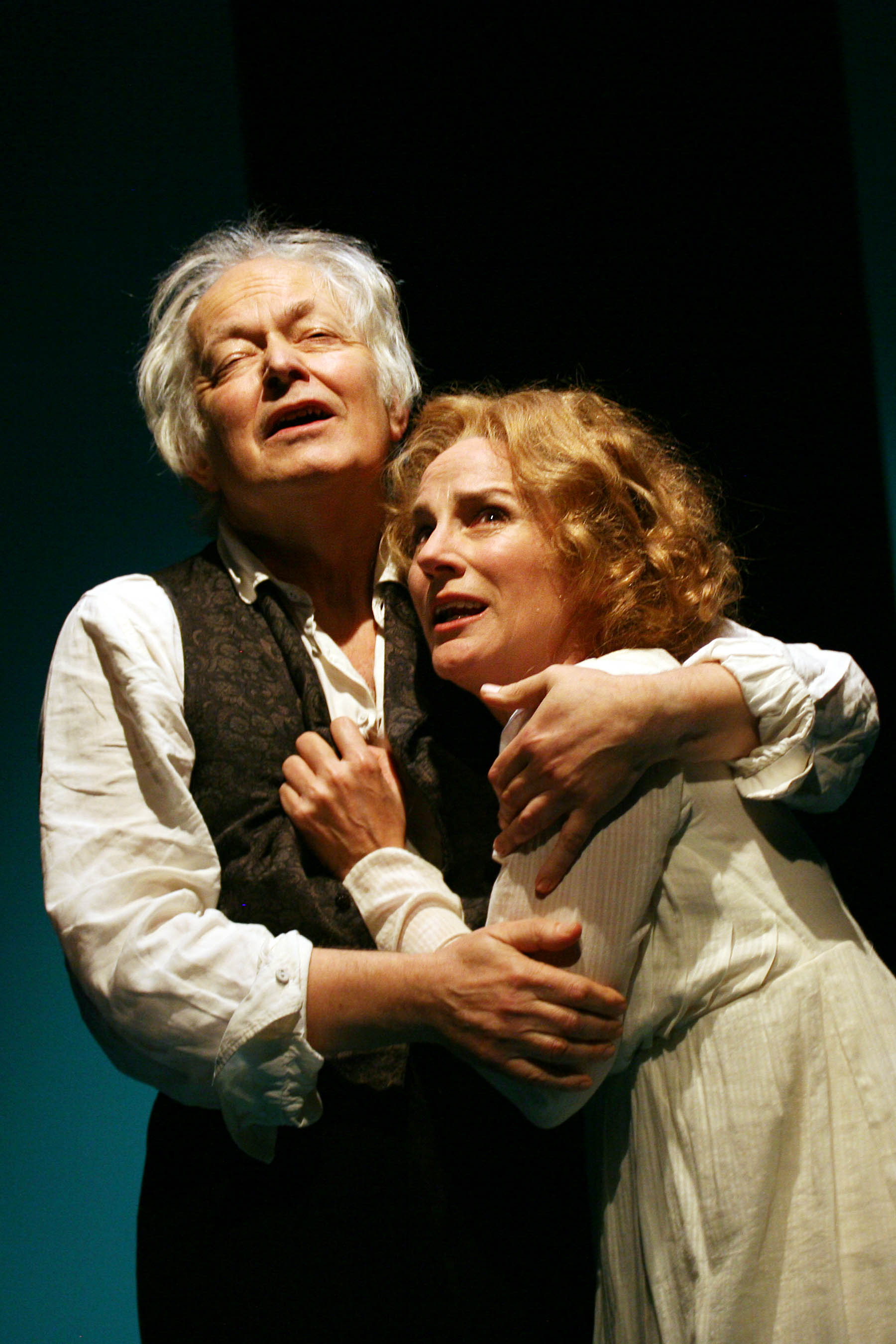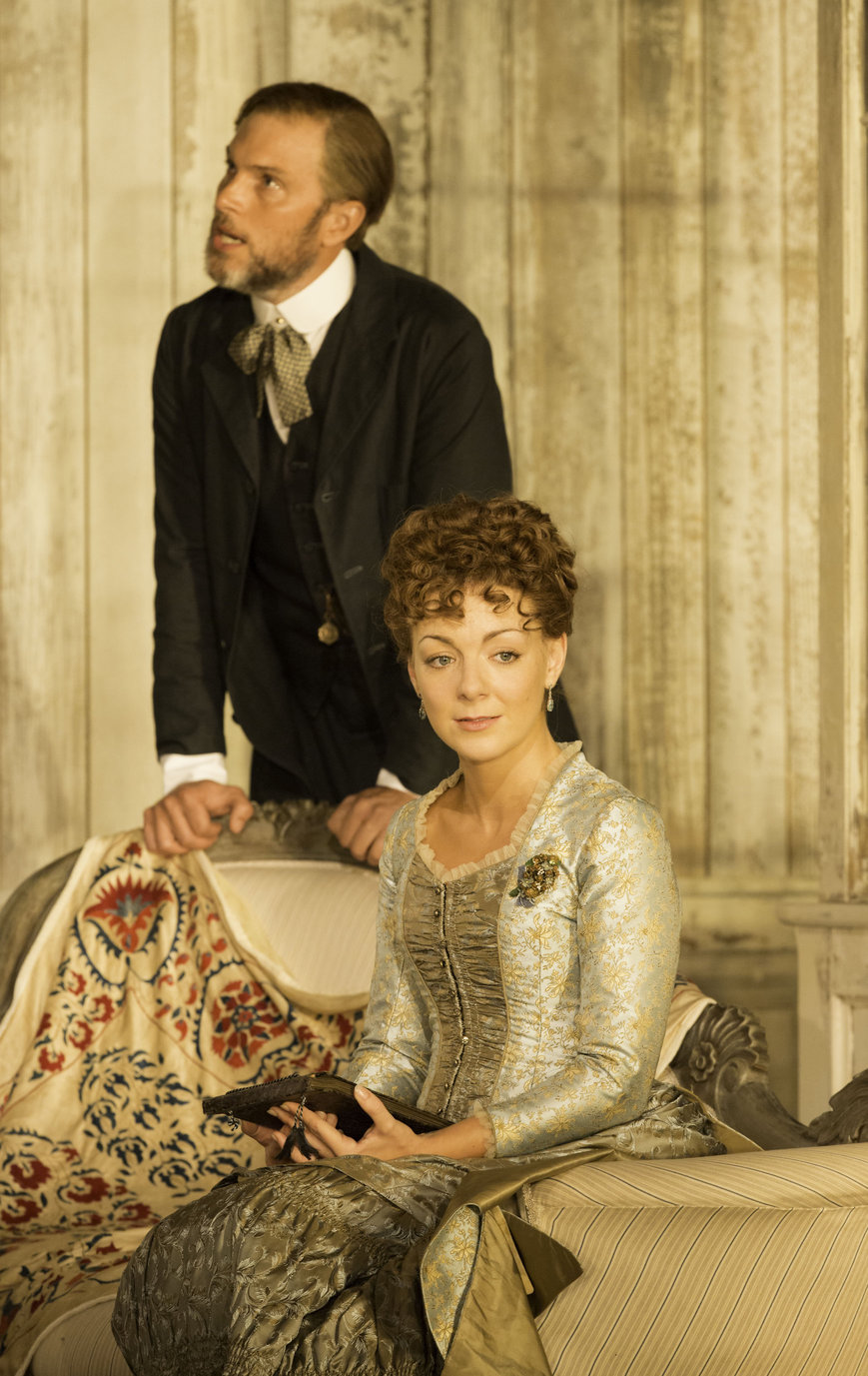Judgement Day, The Print Room | reviews, news & interviews
Judgement Day, The Print Room
Judgement Day, The Print Room
Ibsen's last play has its issues but emerges strongly in this new adaptation

There comes a point in a writer’s life when he – it’s usually a he – stops writing about life and starts writing about writing. With Ibsen this stage arrived in the self-reflexive rage and unquiet of When We Dead Awaken – the play the author seemed to realise would be his last. Brooding on genius, art and the clamour of the everyday, it’s an inhospitable work and not one we see often; London’s last professional revival was almost 20 years ago.
Conceived as a “Dramatic Epilogue”, When We Dead Awaken – a title unaccountably abandoned for Poulton’s adaptation in favour of the much less expansive Judgement Day – glances back over its shoulder at a career of playwriting. Yet in looking back to the creativity of his younger self, Ibsen becomes Orpheus, railing at the resolution he can never have. Familiar symbols and subjects crowd in upon one another here, where all is cold, hard, mountainous and impenetrable. Yet, in a world that lacks the reality of Brand or even The Master Builder, it is only as ghosts, shadows, that they return – present but never really animated with new possibility.
Downie’s diction is the real blade with which she signals her trauma
Staged in traverse, Mike Britton’s set is all straight edges and hard, glassy surfaces, echoing the oppositions – stationary trains, lives “crammed full of spaces” – of Ibsen and Poulton’s texts. Characters inhabit the horizontal extremes of the sloping stage, creating a sense of balance and counterbalance but more practically obscuring important appearances and frequently blocking sight-lines. Chafing elegantly against this minimalist frame and the contemporary delivery of director James Dacre’s cast are period costumes – creating some beautiful visuals, but also making sense of some of the play’s more dated principles. Led by Michael Pennington as ageing sculptor Arnold Rubek, the actors tackle the problem of how to play to Ibsen’s emotional scale (exaggerated in this final work to heightened proportions) while being sensitive to the intensity of The Print Room’s small space. For Pennington the answer comes in a quiet naturalism, a delicately authoritative performance content to leave the larger gestures to Penny Downie.
 Her Irena (Rubek’s original muse and long-lost love, [pictured right with Pennington]) is beguiling. Mercurial and skittish, hers is a virtuoso delivery that takes in rapture and adoration as well, rather unexpectedly, as comedy. Yet it’s the menace that remains uppermost. The small, curved blade she carries with her may be her weapon of choice, but Downie’s diction – the careful monotone that glides over chasms of logic – is the real blade with which she signals her trauma, cutting cleanly through the flesh that binds love to tenderness. It’s a big performance for Sara Vickers’s Maia to match, and while her failure feels rather apt dramatically, there’s a staginess here, a touch of the Miss Julie about her yearnings to break free and sample the bestiality offered by Ulfheim (Philip Correia) that never quite connects.
Her Irena (Rubek’s original muse and long-lost love, [pictured right with Pennington]) is beguiling. Mercurial and skittish, hers is a virtuoso delivery that takes in rapture and adoration as well, rather unexpectedly, as comedy. Yet it’s the menace that remains uppermost. The small, curved blade she carries with her may be her weapon of choice, but Downie’s diction – the careful monotone that glides over chasms of logic – is the real blade with which she signals her trauma, cutting cleanly through the flesh that binds love to tenderness. It’s a big performance for Sara Vickers’s Maia to match, and while her failure feels rather apt dramatically, there’s a staginess here, a touch of the Miss Julie about her yearnings to break free and sample the bestiality offered by Ulfheim (Philip Correia) that never quite connects.
The cast are well served by Poulton’s script, which balances fidelity with clean linguistic lines. A few jarring phrases aside (the era of this fantastical Nordic world is left ambiguous), his images match the clarity of Britton’s design, giving both Pennington and Downie the support that their rather over-symbolised characters need to persuade us through the narrative.
While Ibsen arguably does lose his foothold here, sacrificing the natural flow of action for metaphors that never fully ignite, Poulton’s progress to the climax on the mountain peak is steady. Judgement Dayis a loving treatment of Ibsen’s elderly and somewhat infirm work, a natural fit for The Print Room’s schedule of underexposed plays by major playwrights.
MORE IBSEN ON THEARTSDESK
Ghosts, Duchess Theatre (2010). Iain Glen makes directorial debut with a straightforward take starring Lesley Sharp
The Master Builder, Almeida Theatre (2010). Passions blow hot and cold in this uneven production starring Gemma Arterton and Stephen Dillane
Emperor and Galilean, National Theatre (2011). Power and pace help to exhume Ibsen's Romano-Christian epic starring Andrew Scott
The Lady From the Sea, Rose Theatre, Kingston (2012). Joely Richardson takes on the Ibsen heroine her mother and sister made their own
A Doll's House, Young Vic (2012). Period setting yields a contemporary tragedy adapted by Simon Stephens and starring Hattie Morahan
 Hedda Gabler, Old Vic (2012). Ibsen's heroine draws new depths from the West End's sweetheart Sheridan Smith (pictured)
Hedda Gabler, Old Vic (2012). Ibsen's heroine draws new depths from the West End's sweetheart Sheridan Smith (pictured)
Love's Comedy, Orange Tree Theatre (2012). Early Ibsen finds the playwright in his awkward adolescence
A Doll's House, Royal Exchange (2013). Ibsen in the round loses none of its power to cast a spell
Public Enemy, Young Vic (2013). The horrors of local politics still chime in Richard Jones's queasy production of an Ibsen masterpiece
Ghosts, Almeida Theatre (2013). Richard Eyre and Lesley Manville shine light into Ibsen's dark thriller of family misfortunes
Peer Gynt, Théâtre National de Nice (2014). Irina Brook's song-and-dance Ibsen entertains, but misses the darker shades
The Wild Duck, Belvoir Sydney (2014). Heartbreaking adaptation mixes naturalism and forensic examination
Little Eyolf, Almeida Theatre (2015). Strong women and one weak man in Ibsen's swift study of isolation and guilt
The Master Builder, Old Vic (2016). Ralph Fiennes stars in Ibsen's unsettling mix of the real and the supernatural
Hedda Gabler, National Theatre (2016). Ivo van Hove makes an uneven Southbank debut
rating
Share this article
The future of Arts Journalism
You can stop theartsdesk.com closing!
We urgently need financing to survive. Our fundraising drive has thus far raised £49,000 but we need to reach £100,000 or we will be forced to close. Please contribute here: https://gofund.me/c3f6033d
And if you can forward this information to anyone who might assist, we’d be grateful.

Subscribe to theartsdesk.com
Thank you for continuing to read our work on theartsdesk.com. For unlimited access to every article in its entirety, including our archive of more than 15,000 pieces, we're asking for £5 per month or £40 per year. We feel it's a very good deal, and hope you do too.
To take a subscription now simply click here.
And if you're looking for that extra gift for a friend or family member, why not treat them to a theartsdesk.com gift subscription?
more Theatre
 Othello, Theatre Royal, Haymarket review - a surprising mix of stateliness and ironic humour
David Harewood and Toby Jones at odds
Othello, Theatre Royal, Haymarket review - a surprising mix of stateliness and ironic humour
David Harewood and Toby Jones at odds
 Macbeth, RSC, Stratford review - Glaswegian gangs and ghoulies prove gripping
Sam Heughan's Macbeth cannot quite find a home in a mobster pub
Macbeth, RSC, Stratford review - Glaswegian gangs and ghoulies prove gripping
Sam Heughan's Macbeth cannot quite find a home in a mobster pub
 The Line of Beauty, Almeida Theatre review - the 80s revisited in theatrically ravishing form
Alan Hollinghurst novel is cunningly filleted, very finely acted
The Line of Beauty, Almeida Theatre review - the 80s revisited in theatrically ravishing form
Alan Hollinghurst novel is cunningly filleted, very finely acted
 Wendy & Peter Pan, Barbican Theatre review - mixed bag of panto and comic play, turned up to 11
The RSC adaptation is aimed at children, though all will thrill to its spectacle
Wendy & Peter Pan, Barbican Theatre review - mixed bag of panto and comic play, turned up to 11
The RSC adaptation is aimed at children, though all will thrill to its spectacle
 Hedda, Orange Tree Theatre review - a monument reimagined, perhaps even improved
Scandinavian masterpiece transplanted into a London reeling from the ravages of war
Hedda, Orange Tree Theatre review - a monument reimagined, perhaps even improved
Scandinavian masterpiece transplanted into a London reeling from the ravages of war
 The Assembled Parties, Hampstead review - a rarity, a well-made play delivered straight
Witty but poignant tribute to the strength of family ties as all around disintegrates
The Assembled Parties, Hampstead review - a rarity, a well-made play delivered straight
Witty but poignant tribute to the strength of family ties as all around disintegrates
 Mary Page Marlowe, Old Vic review - a starry portrait of a splintered life
Tracy Letts's Off Broadway play makes a shimmeringly powerful London debut
Mary Page Marlowe, Old Vic review - a starry portrait of a splintered life
Tracy Letts's Off Broadway play makes a shimmeringly powerful London debut
 Little Brother, Soho Theatre review - light, bright but emotionally true
This Verity Bargate Award-winning dramedy is entertaining as well as thought provoking
Little Brother, Soho Theatre review - light, bright but emotionally true
This Verity Bargate Award-winning dramedy is entertaining as well as thought provoking
 The Unbelievers, Royal Court Theatre - grimly compelling, powerfully performed
Nick Payne's new play is amongst his best
The Unbelievers, Royal Court Theatre - grimly compelling, powerfully performed
Nick Payne's new play is amongst his best
 The Maids, Donmar Warehouse review - vibrant cast lost in a spectacular-looking fever dream
Kip Williams revises Genet, with little gained in the update except eye-popping visuals
The Maids, Donmar Warehouse review - vibrant cast lost in a spectacular-looking fever dream
Kip Williams revises Genet, with little gained in the update except eye-popping visuals
 Ragdoll, Jermyn Street Theatre review - compelling and emotionally truthful
Katherine Moar returns with a Patty Hearst-inspired follow up to her debut hit 'Farm Hall'
Ragdoll, Jermyn Street Theatre review - compelling and emotionally truthful
Katherine Moar returns with a Patty Hearst-inspired follow up to her debut hit 'Farm Hall'
 Troilus and Cressida, Globe Theatre review - a 'problem play' with added problems
Raucous and carnivalesque, but also ugly and incomprehensible
Troilus and Cressida, Globe Theatre review - a 'problem play' with added problems
Raucous and carnivalesque, but also ugly and incomprehensible

Add comment